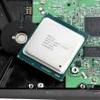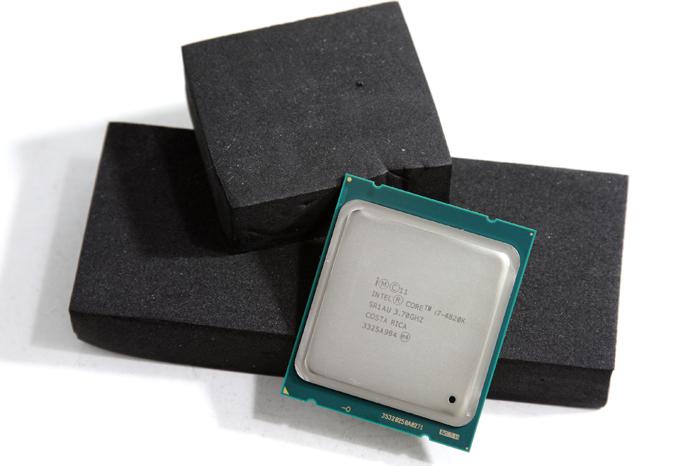Conclusion
Final Words & Conclusion
When we reviewed the six-core Core i7 4960X we where a little bit surprised by the fact that clock-for-clock Ivy Bridge -E really isn't that much faster then the Sandy-Bridge-E generation. Now for the Core i7 4820K that still applies, however there are some advantages here that you need to be aware of.
First and foremost, Intel is competing with itself, and the competing processor for the Core i7 4820K is in fact the Core i7 3770K and 4770K. All these processors are priced roughly similar, both perform logical CPU wise roughly the same. And albeit our tests show it was a hint slower, the truth is that the Core i7 4820K is the more advanced processor as you gain two advantages:
- You get Quad Channel memory compatibility
- Driving multiple graphics cards could favor Core i7 4820K as the X79 chipset has 40 PCI Express Gen 3.0 lanes.
The Experience
We have to honest here, with Ivy Bridge-E the processor might have received a die shrink, but the performance remains roughly the same opposed to the previous generation processors. We already talked about this in the Core i7 4960X review. In that same review I already stated as well that the 4930K (555 USD ) and four core 4820K (310 USD) will be the products that are the more interesting onces. After testing the Core i7 4820K, admittedly I have to acknowledge that I really like this processor. The price / performance ratio is okay, opposed to the 1000 EUR 4960X.
Overall Performance
The overall per core performance remains really nice, Turbo 2.0 kicks in nicely up-to 3.9 GHz. For the professional user who uses heavily threaded software like content creation, that's where Ivy Bridge-E will make a difference. Add to that quad-channel memory with near silly bandwidth and plenty of PCIe lanes and you'll have a platform that will be hard to beat. The Intel X79 chipset is by all means sufficient, but it is dated. I would have loved to see more chipset based SATA3 ports and native USB 3.0 ports amongst others. The manufacturers will adapt and react to that, the MSI X79A-GD65 motherboard used in today's review offers everything you wish and much more. However, the minute the manufacturers have to add ICs and compensate for the chipset, the more components are used driving prices upwards -- and that will make a Ivy Bridge-E PC very expensive. So while I had hopes for a bigger more extensive step in raw processor performance, Ivy Bridge-E however remains to be a ridiculously fast platform. It is just as impressive as the Sandy Bridge-E platform, but not that different at all. Comparing Sandy Bridge-E and Ivy Bridge-E however is a tough thing to do. Both remain very close in both performance, features and overclock potential. I dare say that Sandy-Bridge-E might even be the better processor for overclockers as temperatures do look a notch better.
Overclocking
As you have been able to notice, for the 4820K we have no overclock results. Normally we include these as standard. However, the BIOS we received from MSI resulted into the fact that we just could not get an overclock going. Even activating an XMP profile would result in a boot crash. Very unfortunate. That combined with roughly the one workday of time we have been able to spend on this processor made us halt on overclocking and move on-wards with some multi-GPU testing. Fortunately the processor at default clock frequencies works as expected. The processor in combo with this MSI motherboard however will require a new firmware update.
Multi-GPU gaming
Where in the end a Ivy-Bridge-E platform could make a difference opposed to say Z87, is the X79. You'll get 40 gen 3.0 PCie-lanes at your disposal, and that combined with (preferably) a 6-core processor like the 4930K or 4960X could make a substantial difference once you start adding more and mroe GPUs. If anything our results at the CPU bound medium quality multi-GPU scores (especially at 720P) show a difference in-between four and six core processors. But this test was all about a four core 4820K CPU, and for that processor it was clear that the combo of 4770K with Z87 is a hint faster, as it is the most modern and extremely tweaked platform currently available. Truth be told, I totally did not see coming. But in the future we might re-look into this as I'm confident that there will be more firmware updates for the motherboards coming boosting perf for the 4820K overall a little.
Final Words
Remember if you decide to upgrade the processor on your X79 towards Ivy Bridge-E then update your BIOS first. Without proper support, your motherboard otherwise would not even boot. From A to Z it testing this processor was a very pleasant to test and tweak with. And that's really what high-end gear is all about. But realistically, the next gen E processors really need to be faster or get more cores for Intel to make a substantial enough difference. In closing, we think that an unlocked Core i7-4930K will actually be the most interesting product. However it is expensive at 500 EUR. The next thing in line is today's tested 4820K -- but sure you get 'roughly' the same performance as say a Core i7 2700 / 3770 / 4770. That said, the Core i7 4820K does offer great performance at a fair price in it's default baseline configuration and you do get quad-channel memory support which brings a smile to you face when you see the numbers.
As stated, the 4930K (555 USD ) and four core 4820K (310 USD) just tested will be the products that are the more interesting ones from the Ivy Bridge-E lineup. If you are planning running multiple GPUs, this platform might give you a tiny bit of an edge with its 40 PCie gen 3.0 lanes, however a 4770K on Z87 offers better chipset features and at the moment of writing was a notch faster. As such there is no real winner or loser here today as it's all roughly the same stuff. And I do want to mention, the 4820K is effectively €20 to 30 cheaper then a 4770k! So in the end it will boil down to platform preferences and features offered. Regardless, it most certainly is a processor we can recommend.
Special thanks go out to Tones.be for providing this processor. Give these guys a visit. And hey now, we have a review on the 4960X ready as well - you lucky fellah!
Handy related downloads:
- Sign up to receive a notice when we publish a new article
- Or go back to Guru3D's front page.



